Every article about technology for the hospitality industry seems to start with a similar statement.
It goes something like:
‘advanced software rapidly pushes hotels in a revolutionary new direction’, followed by long lists of solutions with headings such as:
‘Best systems for the hospitality industry [implement today!].’
Whether investing in so many different technologies makes sense is hardly ever discussed.
These articles seem to advocate an ad hoc technology strategy for the hospitality industry, where companies pick software off the shelf whenever a new challenge arises.
We disagree. Without vision or strategy, every tech implementation is doomed to fail.
Without a long-term approach, hotels – and large-scale food service companies – run into all sorts of problems down the line, leading to:
- costly software patch-ups,
- difficulties with staff training,
- low adoption by employees, and
- underwhelming ROI.
As a result, hotel staff will probably continue to use their old spreadsheets on the sly, leaving headquarters with patchy data capture and nothing remotely resembling a data-driven approach.
In this article, we offer a different way of doing things, one that is scalable, agile and futureproof.
The Frustration Of A Low-Tech Environment
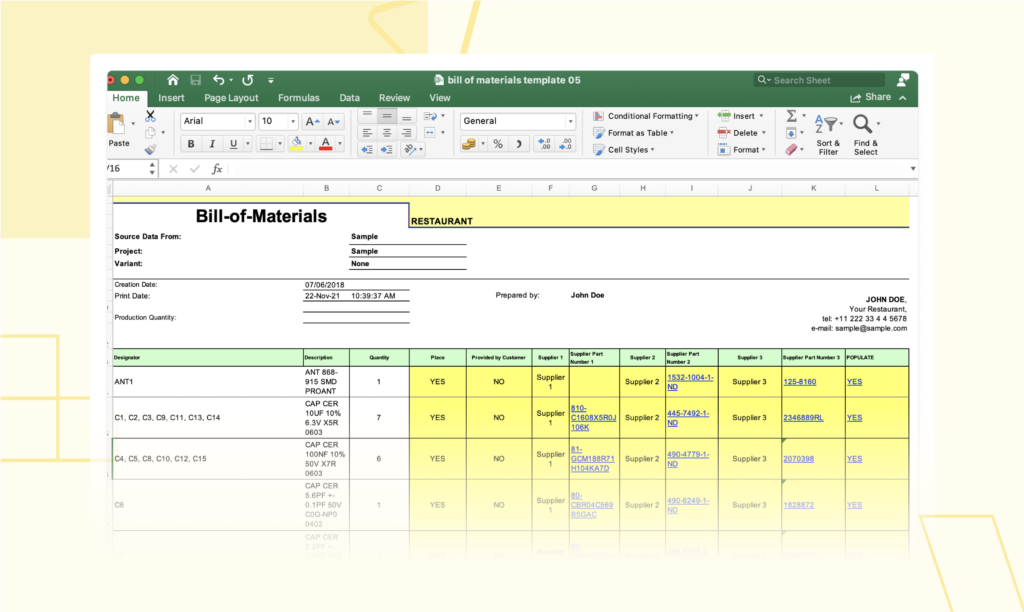
The bottom line of the articles mentioned above is true, of course.
Like everywhere else in society, digitalisation is also at the wheel in the hospitality industry.
Guests are so used to the convenience of digital tools and mobile technology in their daily lives that they expect the same smooth digital experience as soon as they step foot in a hotel lobby.
The downside of that expectation is that frustrations mount quickly when people are confronted with a low-tech environment.
It’s a frustration not only felt by guests.
Employees also experience it when they have to wade through three spreadsheets on a desktop at work to place one order with a supplier; when at home, they can do complex bank transactions with a few taps on their phones.
Digital data are the foundation on which modern hotel operations rest. And that is a good thing.
Hotel tech has proven essential in improving the guest experience and saving time and money—three things that should occupy every business leader.
If data management is fundamental to hotel operations, then it is counterintuitive that long lists of apps would provide the much-needed data.
It runs counter to the ideal of data centralisation and standardisation. What I mean is:
- how do you distil meaningful answers from multiple data sources, and
- how does it improve workload if an employee has to update three apps instead of three spreadsheets?
A New Technology Strategy For Hospitality
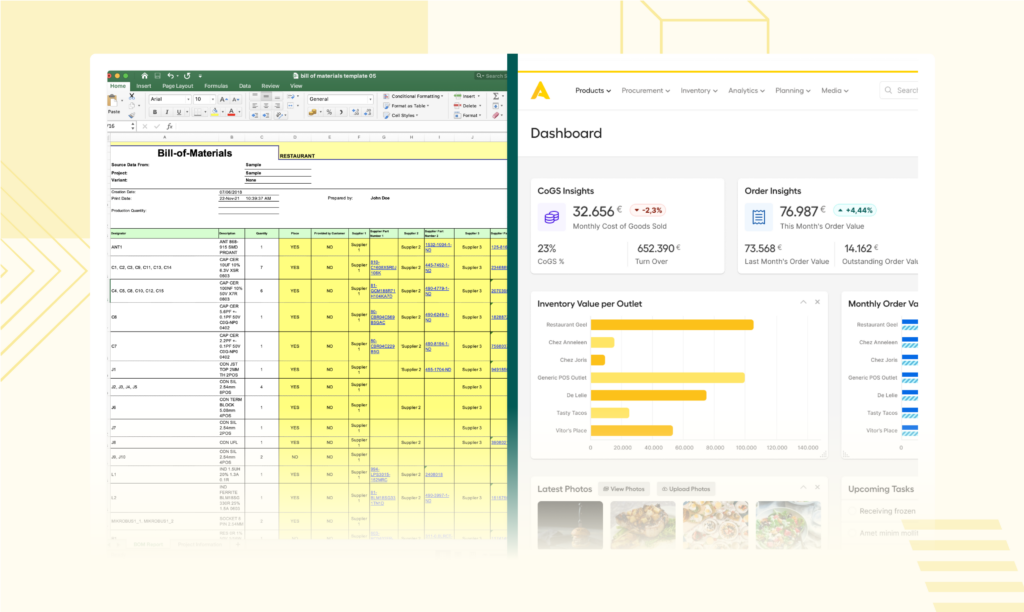
We seem to be making a case for all-in-one hotel software that can do everything.
Unfortunately, despite all the good intentions, these jack-of-all-trades solutions are usually excellent at one trade and deliver jack at most others.
The reason is simple: digitalisation cuts across all departments, so all-in-one software must be able to handle very diverse things and different types of data. It’s a tall order.
The chances of one software system adequately managing restaurant orders, staff planning and bookings is virtually impossible because the required competencies differ wildly.
It is as if you expect the gardener to be as good at trimming the hedges as he is putting together a bill of materials for a dinner service of 500 people.
Hotels don’t need jack-of-all-trades software nor an army of disjointed apps.
The question is, what type of hotel solution fits into an agile, scalable and future-proof tech strategy?
In general, you’ll find three types of solutions. Each comes with its own set of benefits (and pitfalls):
- Legacy systems: Sticking with a legacy system might make sense for some, but there are better options for a multi-unit organisation looking to grow.
- Point solutions: Point solutions are great in one department, but this might come at the expense of the organisation as a whole. If the goal is to future-proof your hotel’s tech strategy, then point solutions aren’t an ideal option.
- Platforms: A platform solution gives hotel operators the ultimate flexibility and scalability. The road to success is rife with potholes, detours and u-turns. A platform can absorb those roadblocks and keep the operation on track for growth.
Recommend read: for a more in-depth look at the different systems go here 👉 Point Solution vs Platform: What Is The Best F&B Tech Strategy For Your Multi-Site Restaurant?
In short, closed one-stop-shop software is fundamentally limited, doomed to inefficiency and, ultimately, more costly (hidden fees skyrocket super quick). And a collection of apps will get you nowhere near anything looking like a strategy that can stand the test of time.
Platform solutions do it better. They can deal with the twists and turns of an unknown future. A platform solves a limited set of related challenges and – crucially – can share data seamlessly via stable APIs with other technology in a hotel’s ecosystem.
From Tech Stack To Ecosystem
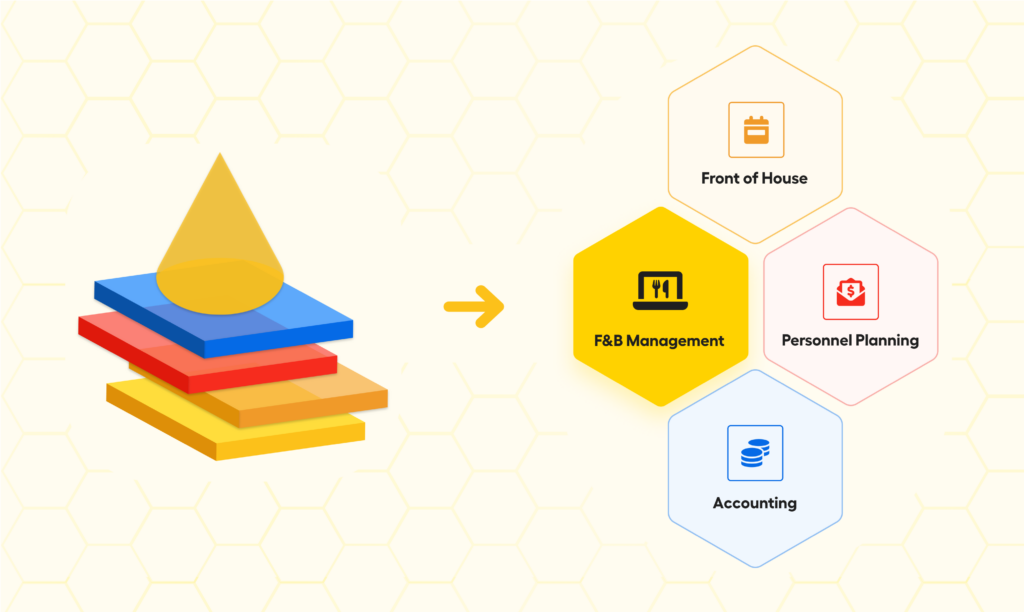
‘Tech stack’, the term puts the finger where it hurts.
A collection of digital solutions in an organisation is called a technology stack. It speaks volumes when you think about where we started: ad hoc tech implementations and the much-needed new approach to hotel technology strategies.
Stack signifies an accumulation of things. It conjures up the image of a pile of computers like the ones between which clichéd hackers from films feel at home, including the obligatory Coke cans and Dorito crumbs. This image doesn’t reflect the fundamental importance of new technology in the hotel industry.
It’s time to retire ‘tech stacks’ and start speaking of ecosystems.
It’s a far better description of the use of technologies in a modern hotel group and how the driving strategy should be approached.
What is a tech ecosystem?
A tech ecosystem is a network of interconnected and interdependent diverse business entities. They come together to support each other and spur innovation sustainably. (Source)
The takeaway of the above definition is that business entities in hotels (Rooms, F&B, Front Desk…) don’t operate in a vacuüm. They depend on each other, and so does the supporting tech.
For example: when the finance team is looking at the P&L report, the numbers on the screen don’t appear out of thin air. They come from Bookings, Purchasing and all the other departments. In a mature tech ecosystem, those numbers aren’t transferred from one department to the other. That would be the old way of doing things. It is time-consuming and error-prone. It keeps HQ from seeing the company as it actually is because, by the time the exported Excel sheets reach the right people, the reality on the floor has already changed.
In a mature ecosystem, everyone is looking at the same numbers, regardless of the app people are using. The data that drives decision-making is available at all times.
There is no running around with spreadsheets, emailing the latest numbers to X,W, Z or consolidating data from one department with those of another.
Two more examples: at an operational level, the benefits of a tech ecosystem can be as ‘simple’ as pushing:
- the number of guests for the next day’s breakfast from the reservation system to the recipe and inventory management system to automatically generate purchase orders for F&B suppliers, or
- the food cost number from the F&B Management Platform to the accountancy platform for cross-checking the received invoices.
It solves two significant challenges: unburdening staff (chefs, F&B manager, finance manager) and eliminating human error when purchasing perishable goods.
“With today’s pace of technological change, it’s vital to be plugged into an ecosystem of products that is constantly evolving and adapting to modern requirements.” – Mews
If ‘ecosystem’ sounds too abstract, think of the Power Rangers.
Remember the Power Rangers?
Think of a hotel’s tech ecosystem as Megazord, the giant robot the Power Rangers transform into when they join forces. Sure, the individual rangers are solid fighters, but they become way more powerful when they join forces.
It’s the same for hotel software. Independently, the technologies are excellent at what they do. Coupled together, they can do much more.
Recommended read: Eventually, everything we talk about in this article brings you closer to digital transformation. If DT is your goal, read this 👉 A Simple 3-Step Blueprint That Will Help You Activate Digital Transformation in Your F&B Operations to fast-track your efforts.
Opportunity – F&B Once Again A Source Of Profit
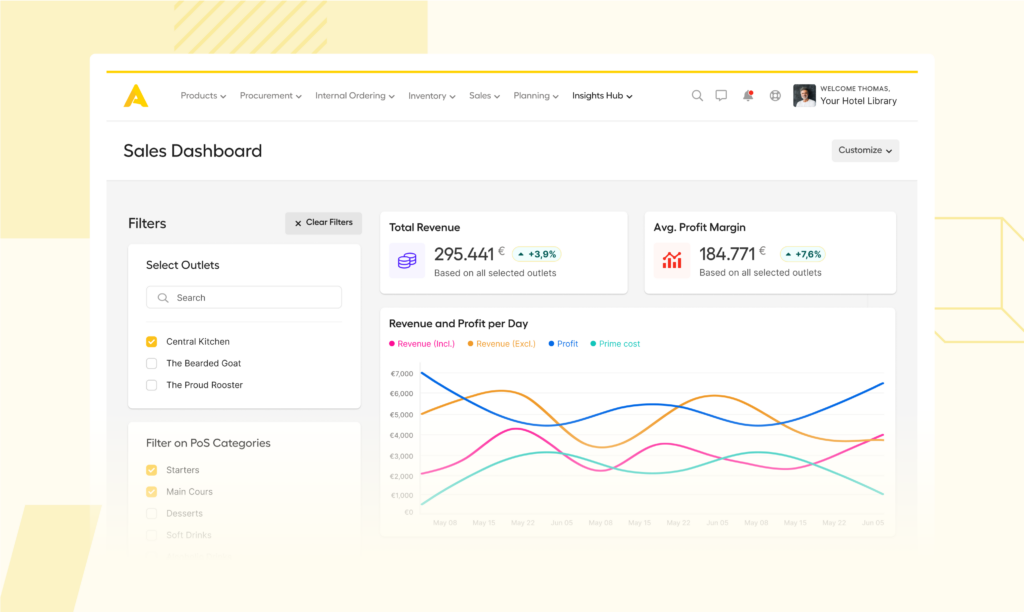
Technological advances play an essential role in the renewed interest in F&B as a source of profit for hotels.
In the past decades, food and drink played second fiddle to room sales, the margin on rooms and RevPAR. Nowadays, hotel operators, however, are looking to food & beverage again to unlock dormant or dwindling revenue streams.
CitizenM, one of the fastest growing hotel groups in the world, recognises food & drink as their second most important revenue source and takes it seriously.
F&B used to be notoriously hard to manage, hence its position on the back burner, but the tech came to the rescue.
A restaurant’s back of house was essentially a black box with a multitude of overlapping processes, ranging from menu engineering, supply chain management, on-demand production and a vast inventory system.
It was chaos.
Modern management software lifts the lid of the black box, streamlines the underlying processes, and provides actionable insights.
As a result, hotels that use a dedicated back-of-house platform can now control food costs and, by doing so, manage margins on drinks, food and menus.
Moreover, they finally have a better handle on food waste and can improve the guest experience by offering nutritional value and allergen information – both automated by the F&B management platform.
Hotels can take things a step further even with a data-driven marketing approach. Thanks to the tech ecosystem, they can analyse guests’ buying habits and leverage targeted marketing material. For instance, someone with a high wine spend may wish to know about a wine dinner at another outlet within the hotel.
Additionally, scaling recipes across worldwide locations is less time-consuming thanks to cloud-based software that can roll out menus groupwide at the touch of a button.
All this contributes to F&B being restored to its former glory as a source of profitability for hotels.
Introducing Apicbase – The F&B Backbone Of A Hotel’s Tech Ecosystem
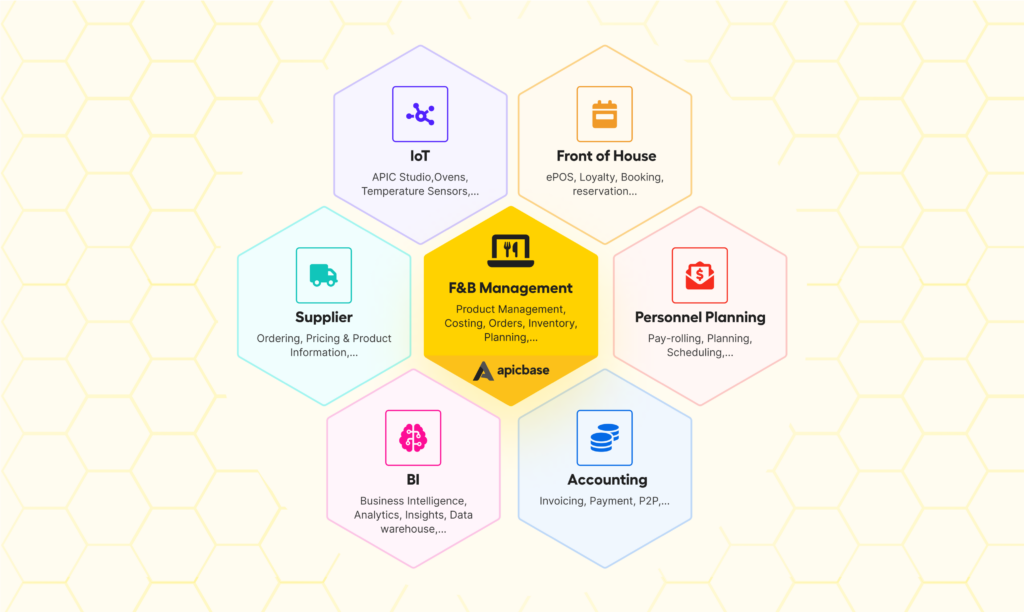
Apicbase is an F&B management platform that offers the full spectrum of back-of-house modules.
It integrates seamlessly with:
- leading POS systems,
- HR and staff management tools,
- wholesale grocers, and
- accounting software.
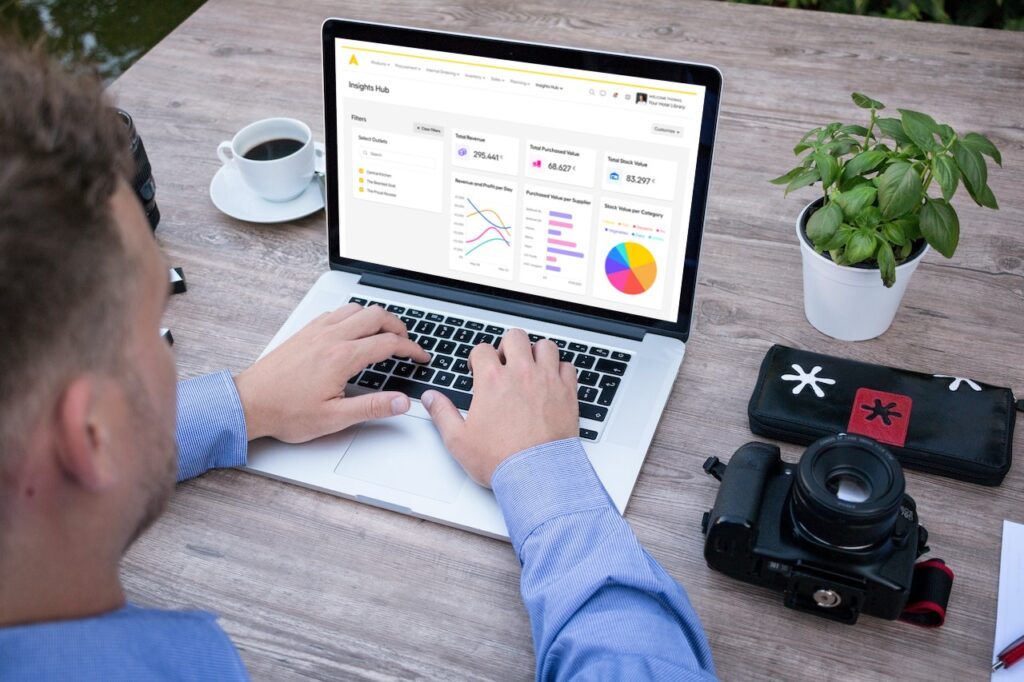
See how it works?
Tell us about your hotel’s operational challenges, and together we will look at possible solutions.

